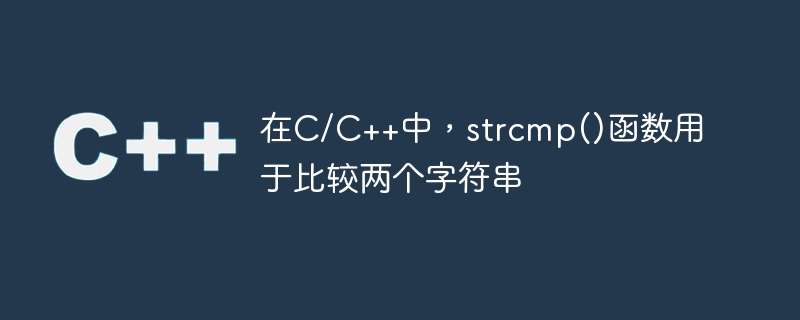C/C++ では、strcmp() 関数を使用して 2 つの文字列を比較します。

関数 strcmp() は組み込みライブラリ関数であり、「string.h」ヘッダー ファイルで宣言されます。この関数は文字列引数を比較するために使用されます。文字列を辞書順に比較します。つまり、両方の文字列を 1 文字ずつ比較します。両方の文字列の文字が等しいか、NULL 文字が見つかるまで、文字列の最初の文字から比較を開始します。
両方の文字列の最初の文字が等しい場合は、2 番目の文字などをチェックします。このプロセスは、NULL 文字が見つかるか、両方の文字が等しくないまで継続されます。
C 言語の strcmp() の構文は次のとおりです。
int strcmp(const char *leftStr, const char *rightStr );
この関数は、次の 3 つの異なる値を返します。比較について。
1.Zero(0) − 両方の文字列が同一の場合、ゼロを返します。両方の文字列のすべての文字が同じです。
C 言語で両方の文字列が等しい場合の strcmp() の例を次に示します。
Example
ライブ デモ
#include<stdio.h>
#include<string.h>
int main() {
char str1[] = "Tom!";
char str2[] = "Tom!";
int result = strcmp(str1, str2);
if (result==0)
printf("Strings are equal");
else
printf("Strings are unequal");
printf("\nValue returned by strcmp() is: %d" , result);
return 0;
}出力
Strings are equal Value returned by strcmp() is: 0
2.ゼロより大きい(>0) −現在左文字列の一致文字のASCII値が右文字列の文字列より大きい場合、ゼロより大きい1を返します
#これは、C 言語での strcmp() がゼロ値を超える例です。 ##include<stdio.h>
#include<string.h>
int main() {
char str1[] = "hello World!";
char str2[] = "Hello World!";
int result = strcmp(str1, str2);
if (result==0)
printf("Strings are equal");
else
printf("Strings are unequal");
printf("\nValue returned by strcmp() is: %d" , result);
return 0;
}左文字列の適合文字の ASCII 値が右文字列の文字より小さい場合、0 より小さい値が返されます。
次は C 言語の中の strcmp() の例です例 オンライン パフォーマンスStrings are unequal Value returned by strcmp() is: 32
#include<stdio.h>
#include<string.h>
int main() {
char leftStr[] = "Hello World!";
char rightStr[] = "hello World!";
int result = strcmp(leftStr, rightStr);
if (result==0)
printf("Strings are equal");
else
printf("Strings are unequal");
printf("\nValue returned by strcmp() is: %d" , result);
return 0;
}以上がC/C++ では、strcmp() 関数を使用して 2 つの文字列を比較します。の詳細内容です。詳細については、PHP 中国語 Web サイトの他の関連記事を参照してください。

ホットAIツール

Undresser.AI Undress
リアルなヌード写真を作成する AI 搭載アプリ

AI Clothes Remover
写真から衣服を削除するオンライン AI ツール。

Undress AI Tool
脱衣画像を無料で

Clothoff.io
AI衣類リムーバー

AI Hentai Generator
AIヘンタイを無料で生成します。

人気の記事

ホットツール

メモ帳++7.3.1
使いやすく無料のコードエディター

SublimeText3 中国語版
中国語版、とても使いやすい

ゼンドスタジオ 13.0.1
強力な PHP 統合開発環境

ドリームウィーバー CS6
ビジュアル Web 開発ツール

SublimeText3 Mac版
神レベルのコード編集ソフト(SublimeText3)

ホットトピック
 7492
7492
 15
15
 1377
1377
 52
52
 77
77
 11
11
 19
19
 41
41
 2 つの文字列の辞書編集上の順序を比較する C++ プログラム
Sep 04, 2023 pm 05:13 PM
2 つの文字列の辞書編集上の順序を比較する C++ プログラム
Sep 04, 2023 pm 05:13 PM
辞書編集的な文字列比較とは、文字列が辞書順に比較されることを意味します。たとえば、「apple」と「appeal」という 2 つの文字列がある場合、「app」の最初の 3 文字が同じであるため、最初の文字列が最後に来ます。次に、最初の文字列の文字は「l」で、2 番目の文字列の 4 番目の文字は「e」になります。 「e」は「l」より短いため、辞書順に並べ替えると最初に表示されます。文字列は配置される前に辞書順に比較されます。この記事では、C++ を使用して 2 つの文字列を辞書編集的に比較するためのさまざまな手法を見ていきます。 C++ 文字列での Compare() 関数の使用 C++string オブジェクトには Compare() があります。
 C/C++ では、strcmp() 関数を使用して 2 つの文字列を比較します。
Sep 10, 2023 am 11:41 AM
C/C++ では、strcmp() 関数を使用して 2 つの文字列を比較します。
Sep 10, 2023 am 11:41 AM
関数 strcmp() は組み込みライブラリ関数であり、「string.h」ヘッダー ファイルで宣言されています。この関数は文字列の引数を比較するために使用されます。文字列を辞書順に比較します。つまり、両方の文字列を 1 文字ずつ比較します。comp を開始します。
 C言語で文字列を比較する方法
May 08, 2021 pm 03:05 PM
C言語で文字列を比較する方法
May 08, 2021 pm 03:05 PM
比較方法: 1. bcmp()、文字列の最初の n バイトが等しいかどうかを比較します; 2. strcmp()、大文字と小文字を区別して文字列を比較します; 3. strictmp()、大文字と小文字を区別しない方法で文字列を比較します; 4. strncmp() または strnicmp()、文字列の最初の n 文字の大文字と小文字を区別した比較。
 C/C++ では、ファイル内のファイル ポインターの位置を移動するために fseek() 関数が使用されます。
Sep 02, 2023 pm 03:57 PM
C/C++ では、ファイル内のファイル ポインターの位置を移動するために fseek() 関数が使用されます。
Sep 02, 2023 pm 03:57 PM
fseek() は、ファイル ポインタを特定の場所に移動するために C 言語で使用されます。オフセットとストリームはポインターのターゲットであり、関数の引数で指定されます。成功した場合はゼロを返します。失敗した場合は、ゼロ以外の値が返されます。以下は、C 言語の fseek() の構文です。 intfseek(FILE*stream,longintoffset,intwhence) fseek() で使用されるパラメーターは次のとおりです。 stream- これは、ストリームを識別するために使用されるポインターです。 offset -これは位置からのバイト数です。 wherece - ここにオフセットが追加されます。 wherece は次の定数で与えられます
 Go言語を使用して文字列比較を実装する方法
Jun 04, 2021 pm 04:13 PM
Go言語を使用して文字列比較を実装する方法
Jun 04, 2021 pm 04:13 PM
Go 言語で文字列を比較する方法: 1. "== 演算子、構文 "String 1 == String 2" を使用します; 2. strings パッケージの ToLower() 関数を使用します; 3. の Compare() を使用しますstrings パッケージ 2 つの文字列を辞書順に比較できる関数、構文は "strings.Compare(str1,str2)"; 4. strings パッケージの EqualFold() 関数を使用して、大文字と小文字を無視した文字列を比較し、戻り値を返します。ブール型です。
 STRCMP 関数を使用して MySQL の 2 つの文字列のサイズを比較する方法
Jul 12, 2023 am 10:13 AM
STRCMP 関数を使用して MySQL の 2 つの文字列のサイズを比較する方法
Jul 12, 2023 am 10:13 AM
MySQL で STRCMP 関数を使用して 2 つの文字列のサイズを比較する方法 MySQL では、STRCMP 関数を使用して 2 つの文字列のサイズを比較できます。 STRCMP 関数は、辞書編集順に従って 2 つの文字列を比較し、比較結果を表す整数値を返します。 STRCMP 関数の構文は次のとおりです。 STRCMP(str1,str2) ここで、str1 と str2 は比較される 2 つの文字列です。 STRCMP関数の戻り値は以下のとおりです。
 MySQL の STRCMP 関数を使用して 2 つの文字列のサイズを比較する方法
Jul 27, 2023 pm 07:01 PM
MySQL の STRCMP 関数を使用して 2 つの文字列のサイズを比較する方法
Jul 27, 2023 pm 07:01 PM
MySQL の STRCMP 関数を使用して 2 つの文字列のサイズを比較する方法 MySQL には、文字列のサイズを比較するために使用できる関数が多数あります。このうち、STRCMP 関数は、辞書編集上の順序に従って 2 つの文字列を比較し、整数値を返すことができます。この記事では、文字列比較に MySQL の STRCMP 関数を使用する方法と、対応するコード例を紹介します。まず、STRCMP 関数の基本構文を見てみましょう。STRCMP(str1,s
 大文字と小文字を無視して 2 つの文字列を比較する Python プログラム
Aug 28, 2023 pm 02:53 PM
大文字と小文字を無視して 2 つの文字列を比較する Python プログラム
Aug 28, 2023 pm 02:53 PM
Python では、「==」、「!=」、「」、「=」などの比較演算子と、 lower() メソッドや upper() メソッドなどの Python 組み込み関数を使用して、大文字と小文字の区別を無視して 2 つの文字を比較できます。 。文字列は、二重引用符で囲まれた一連の文字です。これらの演算子は、文字列の各文字に割り当てられた Unicode コード ポイントに基づいて文字列を比較します。この記事では、文字列の大文字と小文字を無視して 2 つの文字列を比較する方法を学びます。大文字と小文字を無視した文字列の比較 Python で大文字と小文字を無視して 2 つの文字列を比較するには、 lower() 関数または upper() 関数を使用して、文字列をそれぞれ小文字または大文字に変換します。文字列が完全に小さい文字列に変換されたら、




